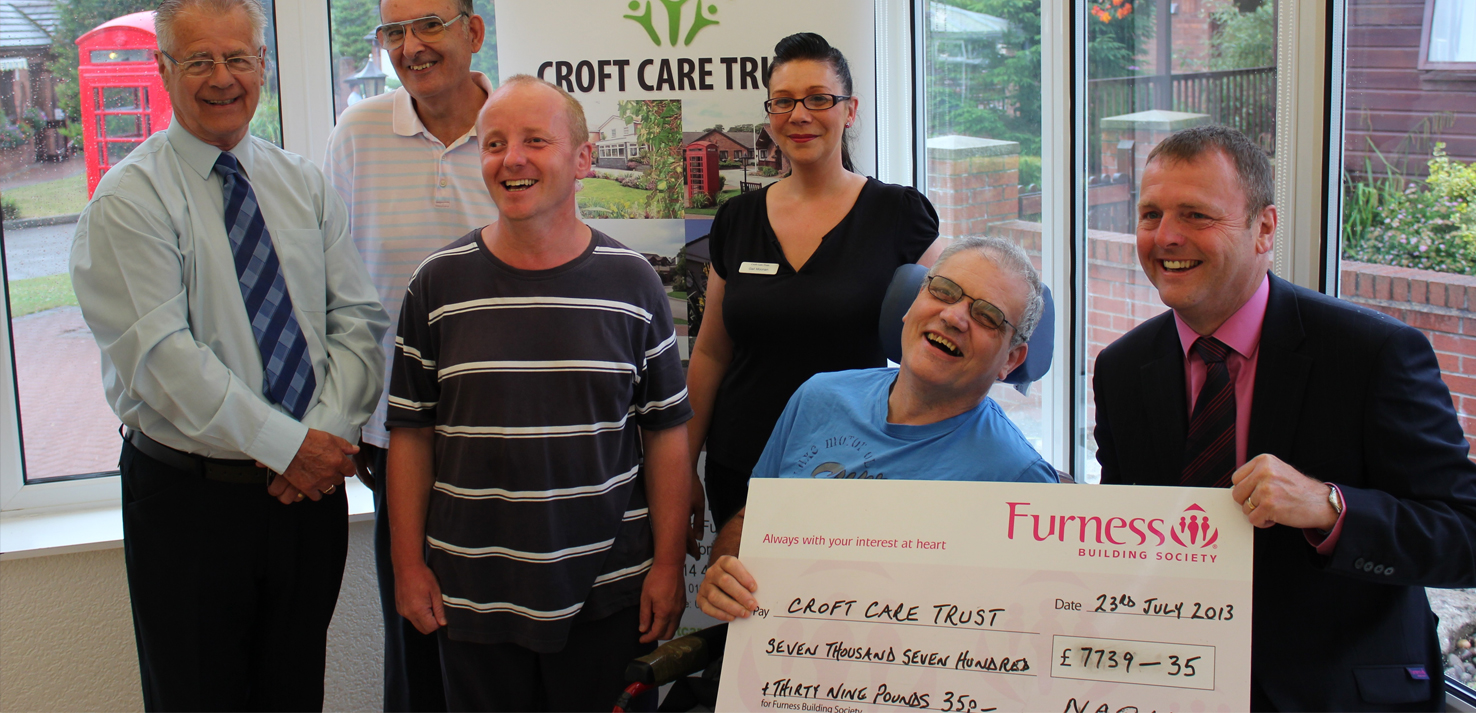Month: September 2019
Over £136,000 awarded to help make a difference to west Cumbrian communities
Community projects across West Cumbria have received a share of £136,000 that will benefit residents in the area, such as improving the life skills of young people and providing sport and recreational activities.
Cumbria Community Foundation awarded £77,144 to more than 20 charitable organisations at its recent grants panel. The money came from 24 grant making funds, including those set up by Nuvia Ltd, Thomas Graham & Sons Ltd and the High Sheriff of Cumbria. 18 people also received a share of almost £14,000 to help towards educational trips.
Thanks to funding of £14,142, the Friday Night Project can continue to offer a wide range of positive activities for young people across Allerdale for another year.
Led by Cumbria Youth Alliance (CYA), seven youth organisations including Wigton Youth Station, Aspatria Dreamscheme, the Castle Hill Trust in Maryport, Kings Church in Cockermouth and South Workington Youth Partnership, give young people a place to go on Friday evening.
Cath Clarke, CYA Chief Officer, said: “Without support from Cumbria Community Foundation and its various funders, none of this would be possible and we are very grateful for the support to be able to continue running the Friday Night Project in Allerdale.”
Cumbria Youth Alliance also received £5,000 from the #iwill Fund to continue its Dreamscheme project, which has been running across Allerdale for the past two years. Young people are encouraged to participate in community-based activity while learning and achieving self-development for themselves and their team.

The WOW (Women Out West) centre, based at Haig Pit Enterprise Park in Whitehaven, received £3,500 from the Brian & Ann Clark Fund to support its volunteers.

Angie Dean, Centre Development said: “This funding means that we can develop our events and activities even further than we had first imagined. I can’t express how grateful we are for the kindness and generosity shown by those involved in the decision to award this fund to us. From all of us here at WOW, thank you very much.”
Annalee Holliday, Grants & Donor Services Officer at Cumbria Community Foundation, said: “It’s great that so many organisations in the west are tackling issues affecting our communities. Thanks to the generosity of our fundholders, we can support these community organisations and help make a positive difference in the county.”
The closing date for Cumbria Community Foundation’s next West Cumbria grants panel is Friday 6th December 2019. For more information, visit www.cumbriafoundation.org or call a member of the grants team on 01900 825760.
Inspiring the next generation
Excitement is in the air. It’s a warm September evening and young people at the Phoenix Youth Project are waiting for two positive role models to join them for a fun-filled fashion shoot.

The charity has received nearly £200,000 in grants from Cumbria Community Foundation since 2004 when a grant supported the start-up of its community-based learning centres. Since then, grants have supported core costs, residential trips, educational courses, including first aid and health and hygiene training, social action projects and the Phoenix Role Models.



Conversation is free flowing. Career aspirations are discussed: “I want to be a photographer when I grow up, I love this!” Confidence is boosted: “I love the clothes, thank you for your time and for being so kind to me, it’s boosted my confidence.”

Luke and Emily who attend the older youth group said: “The role model sessions are excellent, we get to talk about careers, current affairs and experience new things, that we would never have had the opportunity to do anywhere else.”
Paul Rowe, Project Manager of PYP said: “The role models project has helped young people realise their potential, build up an understanding of the possible pathways into work and success, and believe their background is not a barrier.”


The 12 weekly evening sessions focus on personal and social development, supporting and challenging young people appropriately when needed. Speaking to some of the young people, it’s apparent how much the project means to them and the impact it’s had on their lives. Mia said, “I have met new friends and I look forward to coming every week”.
Emily and Billy Jo said: “We look forward to Friday night when we can have fun with our friends in a safe environment. It’s a special time with special friends.


The hidden heroes
In West Cumbria, there are currently around 1,700 young carers. Take Cara for example, she is 14 years old and devotedly cares for her mother who has a physical disability and uses a wheelchair. Without Cara’s devotion and motivation, there would be no one to do practical jobs around the home including washing, cleaning and food shopping.
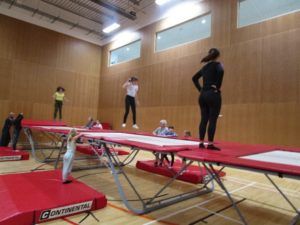
West Cumbria Carers operates across Allerdale and Copeland and provides support to 1,900 adult carers and 300 young carers, some as young as five. Since 2006, the charity has received more than £256,000 to support carers in West Cumbria.
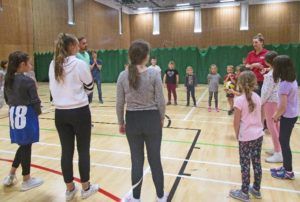
The one to one sessions really helped Cara when she was feeling stressed. She could talk to a support worker and they worked together to help her develop strategies to improve her emotional resilience and help her deal with stress.
Another young person who has benefited from one to one support is 11 year old Jessica. She is a young carer for her mother who has a mental health condition. Jessica doesn’t know if her mum will be at home or not when she returns from school. Her mum tries to shield her as much as possible but she knows that Jessica still worries about her. Jessica also worries about her own mental health and whether she will develop the same illness as her mum.
When Jessica first joined the young carer’s project, she was very shy and didn’t like to mix with the other children. Two years later, she is a regular at the groups and trips and has made lots of new friends. Jessica said: “It’s nice to be able to talk to other children who understand what it’s like to be a young carer.”
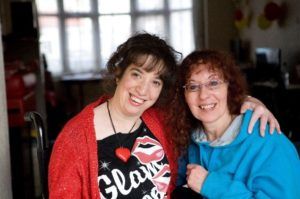
Support to adult carers includes driving carers to health appointments, providing volunteers to sit with people so carers can go out, and helping them access information, advice and services. The charity also provides training to local businesses to help them manage working carers in their workforce.
Andrea Carlton, a senior support worker, said: “Social isolation both for the carer and the cared for person is huge. We try to get people to come to us before their situation reaches crisis point. There’s a lot of people aged between 45-65 who are at the peak of their careers that are also in a caring role.”
Angela Longrigg, volunteer and projects coordinator, added: “We also have many ‘sandwich carers’ who have young children and are also caring for a parent. They have no time for themselves and tend to put their own health at the bottom of the list.”

Supporting the young people of Cumbria
Based in Workington, Cumbria Youth Alliance (CYA) was set up in 1997 and has received over £300,000 from Cumbria Community Foundation since 2003. Each year, it works with around 2,000 young people around the county, focussing on the most deprived areas, to help them reach their full potential.

The number of young people at risk of being NEET (not in education, employment, or training) is higher than the national average in West Cumbria. The ‘First Steps to Employment’ project offers one-to-one support for young people in West Cumbria to address issues and barriers to engagement in education, training and work. Each young person develops their own action plan to identify the ‘steps’ needed to reach their employment goals and identify and achieve their aspirations.

“Access to positive activities really assists with ensuring young people make a successful transition into adulthood. They become more engaged and we notice marked improvements in their behaviour. Many young people started on the programme as beneficiaries and have now moved into volunteering positions, helping more young people to benefit in the communities.”

The ‘Every Young Voice Counts’ project received funding to engage young people in the democratic processes and structures. It was designed to generate interest in how local decisions are made and how young people can influence these decisions. A series of democracy workshops were delivered to more than 350 Cumbrian youngsters in schools and youth clubs.
Another grant supported a mental health and emotional resilience project, called ‘With the Future in Mind.’ The project trained a network of young people in secondary schools and colleges across West Cumbria as peer leads around the emotional resilience agenda. Pupils became Mental Health First Aid champions and will support their fellow peers in years to come. This is the ultimate legacy; with young people having a greater understanding of what constitutes good mental health and emotional resilience.
Young people face many challenges as they move into adulthood, but for the 2,000 youngsters who benefit each year from CYA’s support, they become better equipped as they go on in life and learn some of the skills needed to improve their life chances and aspirations.
Keeping the community together; ‘I have waited 26 years for a club like this’
A warm welcome and a room full of laughter is what awaits you at Mirehouse Residents Group in Whitehaven.
Formed in 2008, the committee of seven encourage local residents and agencies to implement projects and events that get generations working together to improve their quality of life and reduce social isolation.

Word quickly spread and members flocked in. The group started to plan for future activities and soon became a lifeline to many that may otherwise have become isolated from the community.
Since 2010, Mirehouse Residents Group has received £69,284 from the Foundation. The first grant enabled the local neighbourhood warden to relocate to the community centre and help address fears of crime in the community. Mirehouse is one of the most deprived wards in England and fear of crime is the biggest problem for its residents.
Grants have supported the running costs of the group and also the costs of community workshops such as poetry and song writing during National Poetry Week. This encouraged local people of all ages to take up creative writing.
Keith Cartner, Community Coordinator, said: “The project encouraged intergenerational activity, as well as improving basic skills in literacy and giving the residents the courage to put their work forward. It was the first time something of this nature had been tried in the heart of the community, and gave residents a first chance to engage in cultural performance and activity.

Jenny said: “Without the camaraderie created through Cumbria Community Foundation’s support, this could never have been imagined. Here is a poem from Jenny’s collection about her memories of one of Mirehouse’s community club’s:
The Calder Club was the place to go
The people of Mirehouse loved it so
Groups came from far and wide
Artists, singers, comedians, you were lucky to get inside.
People booked it for weddings, christening parties too
And some for funeral parties, which sadly wasn’t a ‘do’.
There was a lovely lounge, where people gathered for drinks and chat,
Men played cards and dominoes, while the women talked and sat.
There was badminton and bingo, a quiet snug to sit and browse,
To sit in peace and quiet, away from all the crowds
At Christmas there were parties, one for children too,
New Year’s Eve was a great night out, we were often there till two.
It was the best club in Cumbria and sadly now it’s gone,
But we will never forget the Calder Club,
For in our memories
It lives on.
Today you will find Edith Dickinson, a regular to Mirehouse Residents Group, sharing memories and tales of the past. She really does fill the room with laughter with her stories. Born in 1932, Edith has been a resident of Mirehouse for most of her life. She reminisces and remembers how ecstatic she was to move to the estate. Edith said: “The neighbours were all lovely. A lot of the people on the street have lived here as long as me, or longer. We talked to everybody; we knew everybody and talked over the fences. I have waited 26 years for a club like this!”

Alongside Food for Thought, the Fit for Life project has been getting families together for sessions incorporating health, exercise, cookery and other skills to help them towards a healthier lifestyle and increased confidence and self-esteem.

The area around Mirehouse cattle arch, used daily by school children and the community, had been littered with drug paraphernalia and attacked by vandals, and was ‘intimidating’ to older people. The youth group worked with The Colourful North to paint the walls of the arch, which has now become a much safer area to walk through as parents drop their children off and collect at school.
Mirehouse Residents Group continues to grow, and this group proves its residents are proud to live there and work as a community for the good of the neighbourhood.
Development Assistant
Would you like to be part of our team here at our offices in Dovenby near Cockermouth?
We address disadvantage in Cumbria by making grants to charitable groups and individuals on behalf of our fundholders and supporters.
The role of Development Assistant underpins the work of the Development team, undertaking research, managing data, providing information and practical support to staff and trustees. The role also includes event organisation, significant project work and lead responsibility for relations with professional advisers.
For further information please download the job description.
For an informal discussion about the role, please contact Andy Beeforth on 01900 825760.
To apply please complete the application form, and submit by the closing date, midnight 6 October. Interviews commence week beginning 14 October.
Half a million windfall thanks to offshore wind farm
Communities along the coast of Allerdale have shared more than half a million pound thanks to an energy firm’s investment over the last ten years.
The Robin Rigg West Cumbria Fund was set up when the Robin Rigg offshore wind farm was built by energy company, E.ON, just off the coast of Workington. Managed by Cumbria Community Foundation since 2009, the fund has provided grants of up to £15,000 to community projects along the Allerdale coast that promote sustainable use of energy and resources, reduce climate change, and support nature conservation.
Cumbria Biodiversity Data Centre (CBDC) received £10,000 to recruit local volunteers to map, identify and record the habitats and species along the Solway plain.
Deborah Muscat, Manager at CBDC, said: “Much is known about the birds and Natterjack toads in the area but there is less information about the whereabouts of other plants and animals. Thanks to the funding, the Solway Nature Network was set up in 2018 to discover more about the natural history of the Solway.

“We have also been able to support the volunteers to take part in other activities such as Cumbria Wildlife Trust’s Get Cumbria Buzzing project, the National Plant Monitoring Scheme and CBDC’s recording days. The more practice the volunteers have, the better they become and the more likely we will continue to receive information from them.”
Maryport Inshore Rescue received two grants totalling £19,838. Mike Messenger, Operations Manager, said: “In 2013, we installed an environmentally-friendly rainwater harvesting system and the first set of solar panels on the east side of the building. We were supported once again earlier this year to install additional solar panels on the west side of the building. This has reduced our carbon footprint and has reduced our energy bill significantly, which is fantastic as funds saved go towards the running costs of the charity.

In Workington, Northside Community Centre received £23,790 from the Robin Rigg Fund for the installation of solar panels and the replacement of internal light fittings.
Stella Kent, Centre Manager said: “Thanks to funding, we have been able to reduce the cost of our energy bills, which is great news in this current climate of ever rising energy bills. The installation of solar panels on the roof means we have benefited from using renewable energy and also receive an income from the feed-in tariff payments received for any excess electricity generated, which is exported to the local grid.”
Emma Skelton, Business Service Co-ordinator at E.ON, said: “The Robin Rigg West Community Fund has delivered some fantastic projects which have promoted the sustainable use of energy and resources, supported nature conservation and addressed other environmental needs of the communities local to Robin Rigg. I’m truly delighted with what has been achieved over the last decade and I would like to thank Cumbria Community Foundation for the big part they have played in making these projects a reality and a success.”
48 community organisations benefited from the fund, totalling more than £546,000. Annalee Holliday, Grants & Donor Services Officer at Cumbria Community Foundation, said: “The fund provided a valuable, long-term, sustainable and reliable source of income for the local communities that neighbour the wind farm. Promoting sustainable living is so important these days, and funds set up by local businesses such as E.ON have been crucial in helping projects make a bigger impact in their area.
“The legacy of the Robin Rigg West Cumbria Fund will last for many years to come.”
Cricket club boosted by funding
Members of Tallentire Cricket Club are celebrating after receiving a grant for £1,858 from the Tallentire Wind Farm Community Benefit Fund.
Managed by Cumbria Community Foundation, the Tallentire Wind Farm Community Benefit Fund provides grants to support community, educational or environmental activities.
Stephen Moore said: “The members of Tallentire Cricket Club are pleased and grateful to have received a grant from the Tallentire Wind Farm Fund through Cumbria Community Foundation.
“This will be used to buy new equipment over the winter so that we shall be ready to go at the start of next season. Our club plays friendly matches against other villages and teams of similar standard on weekday evenings throughout the spring and summer. It is becoming harder to find sufficient opponents to provide a full fixture list for the season so if there are any other similar teams looking for a game, we should be glad to hear from them. We are doing our best to keep village cricket alive in this area.”

The six turbines at Tallentire Wind Farm began operating in summer 2013. RES established a community benefit fund with an initial £175,000 and around £30,000 annually for the lifetime of the wind farm. More than £300,000 has already been awarded to the communities neighbouring the Tallentire Wind Farm: Bridekirk, Blindcrake, Gilcrux and Plumbland.
Gary Higgs, Grant Officer at Cumbria Community Foundation said: “The fund provides a valuable, long term, sustainable and reliable source of income for the local communities that neighbour Tallentire Wind Farm. It is flexible funding that can address what is really important to communities and we’re delighted to administer this funding which has been making a difference to the communities surrounding the Wind Farm.”
Cumbria Community Foundation was appointed by RES to manage the community fund. The Foundation works with communities to help them decide how funds should be allocated. Using its grant making expertise, the Foundation supports the community awarding grants that deliver a lasting impact.
Applications for funding must be received by Friday 6th December 2019 for a decision on 8th January 2020. For more information on the Tallentire Wind Farm Community Benefit Fund or to apply online, please visit www.cumbriafoundation.org or email gary@cumbriafoundation.org.
Over £89,000 awarded to help make a difference to Cumbrian communities
Community projects across the county have received a share of £89,000 to tackle issues around mental health, rural isolation, financial wellbeing and to improve access to sport and recreation.
26 charitable organisations received a share of the £77,144 at Cumbria Community Foundation’s recent grants panel. The money came from 24 grant making funds, administered by the Community Foundation, including those set up by the Cumberland and Westmorland Herald, the William Milburn Charitable Trust and Westmorland Family Community Fund.
18 people also received a share of 12,616 to help towards educational and vocational training fees.
The Lighthouse Community Mental Health Hub located at the rear of Stricklandgate House in Kendal can now provide a year of mental health support thanks to £3,500 from the Brian & Ann Clark Fund and Johnson Fund. The drop-in sessions are open to anyone wishing to maintain or improve their emotional or mental health.
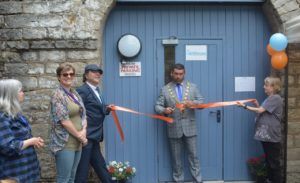
Penrith Cricket Sports and Social Club has 20 years of delivering high quality coaching. It was awarded £1,500 from the Rowan Fund and the Cumberland and Westmorland Herald Fund to support its volunteer expenses. This will increase the number of coaches and help deliver more sessions during both the winter and summer, and introduce female and disability sessions.


Other grants awarded include £5,500 to Kendal Gymnastics Club from the Castle Green Grassroots Fund, Cumbria Young People’s Grassroots Fund and the Fryer Grassroots Fund. The grant will help the club to relocate and expand into new premises. The club is extremely popular in the local region and more gymnasts wish to join than there is space available. The club wishes to set up a leadership academy for teenagers and adults to train to become a coach or judge.
Carlisle Society for the Blind received £5,000 from Abbeyfield Carlisle Society Over 55 Community First Fund and Janetta Topsy Laidlaw Trust Fund. The grant will support its regular, monthly home visiting service to 80 members with different levels of visual impairment and sight loss across the Carlisle district. This support to predominantly elderly people includes, general advice, demonstration of household adaptations, help in reading mail and writing letters.
Ellen Clements, Senior Grants & Donor Services Officer at Cumbria Community Foundation, said: “Thanks to the generosity of our fundholders we are able to support many worthy community organisations around the county. These organisations are vital for tackling issues affecting our communities.”
The closing date for Cumbria Community Foundation’s next main grants panel is 27th September 2019. For more information, visit www.cumbriafoundation.org or call a member of the grants team on 01900 825760.


